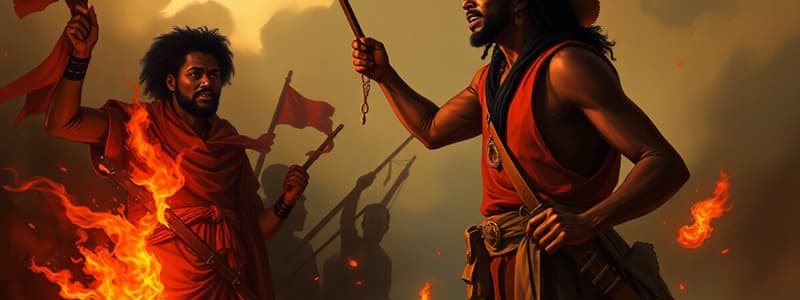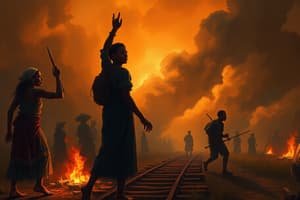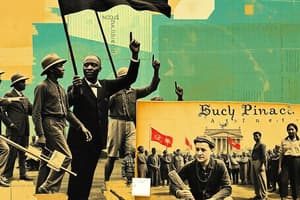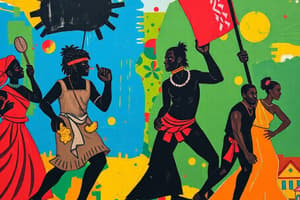Podcast
Questions and Answers
What was a primary reason many slaves wanted to escape to the North?
What was a primary reason many slaves wanted to escape to the North?
- They could reunite with their families.
- The North had better weather conditions.
- There were more job opportunities in the North.
- Slavery was illegal in the North. (correct)
What was one of the main impacts of the Transatlantic slave trade on West Africa?
What was one of the main impacts of the Transatlantic slave trade on West Africa?
- Loss of young, strong laborers. (correct)
- Cultural exchange with Europeans.
- Increase in agricultural production.
- Economic prosperity due to trade.
Which figure is known for leading a significant slave uprising?
Which figure is known for leading a significant slave uprising?
- John Brown
- Harriet Tubman
- Frederick Douglass
- Nat Turner (correct)
What psychological effect did slavery have on many Americans?
What psychological effect did slavery have on many Americans?
What was the function of the Underground Railroad?
What was the function of the Underground Railroad?
What type of storytelling method was used by enslaved people to share their experiences?
What type of storytelling method was used by enslaved people to share their experiences?
What was a consequence of the Civil War regarding slavery?
What was a consequence of the Civil War regarding slavery?
Which of the following best describes the treatment of slaves by plantation owners?
Which of the following best describes the treatment of slaves by plantation owners?
What emotional response did slave children commonly experience towards Europeans?
What emotional response did slave children commonly experience towards Europeans?
Which of the following was considered a peaceful form of resistance by slaves?
Which of the following was considered a peaceful form of resistance by slaves?
What was one of the violent methods of resistance employed by slaves?
What was one of the violent methods of resistance employed by slaves?
What was the primary motivation behind Nat Turner leading a rebellion against slavery?
What was the primary motivation behind Nat Turner leading a rebellion against slavery?
How did Nat Turner and his followers primarily move to gather more support for their rebellion?
How did Nat Turner and his followers primarily move to gather more support for their rebellion?
What was one of the negative consequences of Nat Turner's rebellion?
What was one of the negative consequences of Nat Turner's rebellion?
What factor induced the psychological sense of inferiority among slaves?
What factor induced the psychological sense of inferiority among slaves?
What was a common method of flight among slaves?
What was a common method of flight among slaves?
What was one major psychological effect of slavery on the enslaved people?
What was one major psychological effect of slavery on the enslaved people?
What significant action did Nat Turner and his followers take during their rebellion?
What significant action did Nat Turner and his followers take during their rebellion?
Which of the following laws were passed as a direct consequence of slave uprisings?
Which of the following laws were passed as a direct consequence of slave uprisings?
What nickname was given to Harriet Tubman due to her work with escaping slaves?
What nickname was given to Harriet Tubman due to her work with escaping slaves?
What method did Harriet Tubman use to protect herself during her missions?
What method did Harriet Tubman use to protect herself during her missions?
What significant event was John Brown known for during his mission against slavery?
What significant event was John Brown known for during his mission against slavery?
What was one of the major outcomes following John Brown's trial for treason?
What was one of the major outcomes following John Brown's trial for treason?
How did the actions of Harriet Tubman influence perceptions about slavery in America?
How did the actions of Harriet Tubman influence perceptions about slavery in America?
Flashcards
Slave Resistance
Slave Resistance
Methods used by enslaved people to oppose their oppression, which included both peaceful and violent acts.
Peaceful Resistance (Slaves)
Peaceful Resistance (Slaves)
Non-violent methods slaves used to oppose their masters, such as slowing down work, accepting pain without protest, and avoiding duties.
Violent Resistance (Slaves)
Violent Resistance (Slaves)
Actions like suicide, arson, or murder used by slaves against their owners to fight back.
Nat Turner's Rebellion
Nat Turner's Rebellion
Signup and view all the flashcards
Nat Turner
Nat Turner
Signup and view all the flashcards
Harriet Tubman
Harriet Tubman
Signup and view all the flashcards
Underground Railroad
Underground Railroad
Signup and view all the flashcards
John Brown
John Brown
Signup and view all the flashcards
Abolitionist
Abolitionist
Signup and view all the flashcards
American Civil War
American Civil War
Signup and view all the flashcards
Slavery
Slavery
Signup and view all the flashcards
Escape
Escape
Signup and view all the flashcards
Underground Railroad (Network)
Underground Railroad (Network)
Signup and view all the flashcards
Harpers Ferry
Harpers Ferry
Signup and view all the flashcards
Sluggishness
Sluggishness
Signup and view all the flashcards
Passivity
Passivity
Signup and view all the flashcards
Indifference
Indifference
Signup and view all the flashcards
Shirking
Shirking
Signup and view all the flashcards
Flight
Flight
Signup and view all the flashcards
Suicide
Suicide
Signup and view all the flashcards
Arson
Arson
Signup and view all the flashcards
Murder
Murder
Signup and view all the flashcards
Study Notes
Slave Resistance
- Slaves resisted their oppression through both peaceful and violent methods.
- Peaceful resistance included:
- Sluggishness: Slaves worked slowly.
- Passivity: Slaves accepted pain and humiliation without resistance.
- Indifference: Slaves showed a lack of concern for their situation.
- Shirking: Slaves avoided their assigned duties.
- Flight: Slaves ran away to escape the unbearable conditions of slavery.
- Violent resistance included:
- Suicide: Slaves took their own lives when their suffering became unbearable.
- Arson: Slaves set fire to their owners' buildings as a form of protest or revenge.
- Murder: In some cases, slaves, driven by anger and desperation, killed their owners.
Nat Turner's Rebellion
- Nat Turner, born in 1800, was a literate slave who led a rebellion against slavery in Virginia.
- Turner believed in freeing slaves, inspired by religious visions, and preached his belief to other slaves.
- In 1831, Turner, with around 70 followers, attacked multiple plantations across Virginia.
- The rebellion resulted in the deaths of around 60 white people and freed slaves, but the rebels were ultimately captured.
- The rebellion had severe consequences:
- Fear and hysteria: White communities across the South were overcome with fear, leading to the deaths of many innocent slaves.
- New restrictions on slaves: New laws were passed, restricting slaves' assembly, making it illegal for them to learn to read and write, and ultimately driving up illiteracy rates amongst enslaved people.
Harriet Tubman
- A former slave, Harriet Tubman escaped slavery and dedicated her life to helping others escape as well.
- Dubbed "Moses" for her work on the Underground Railroad, she helped over 300 slaves escape to freedom in the North and Canada.
- During the American Civil War, Tubman served as a spy for the Union army and worked tirelessly to establish shelters for the poor.
- Tubman was a fierce advocate for women's rights and became a celebrated symbol of freedom and resistance.
John Brown
- John Brown was a fervent abolitionist who believed in ending slavery through violent means.
- He was a friend of Harriet Tubman and assisted in the Underground Railroad, helping slaves reach freedom.
- Brown's passionate activism led to the burning of his home and the death of his son by those who supported slavery.
- In 1859, Brown led an unsuccessful attempt to instigate a slave rebellion by raiding the federal armory at Harper's Ferry, Virginia.
- His actions resulted in the deaths of his sons and his own capture.
- John Brown's speeches during his trial brought the brutality of American slavery into the national spotlight.
- He was hanged for treason, becoming a martyr to the cause of abolition.
The Underground Railroad
- The Underground Railroad was a network of secret routes and safe houses used by enslaved people to escape to freedom.
- It wasn't an actual railroad, but a metaphor for the clandestine nature of the escape network.
- Slaves often fled to the North, Canada, and Mexico, where slavery was illegal.
The American Civil War
- Between 1861 and 1865, the United States was torn apart by the American Civil War.
- The conflict was driven by the issue of slavery. The North, led by President Abraham Lincoln, opposed slavery while the South depended on slave labor and wanted to retain the practice.
- After four years of brutal fighting, the North emerged victorious, leading to the abolition of slavery in the United States.
- The war's legacy was deeply ingrained in the hearts of the North, especially through the memory of John Brown, whose sacrifices were honored thr
Studying That Suits You
Use AI to generate personalized quizzes and flashcards to suit your learning preferences.




